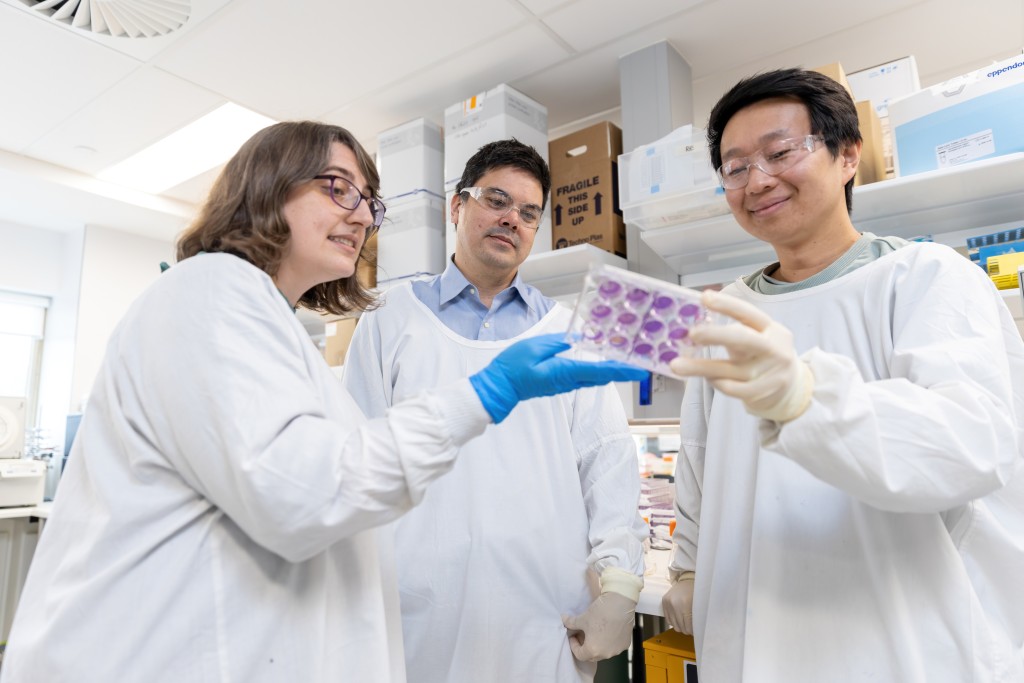Pushing back against viruses with pandemic potential
Health Security Systems Australia (HSSA) is working with experts at the University of Melbourne at the Peter Doherty Institute for Infection and Immunity (Doherty Institute), The University of Queensland’s National Biologics Facility, and industry partner Biointelect Pty Ltd to develop a novel therapeutic platform technology to combat multiple viral pathogens with pandemic potential.
Over the next three years, the collaboration will progress the development of potent monoclonal antibodies for the treatment and prevention of viral infections, including Orthopoxviruses such as monkeypox and smallpox, and Henipaviruses such as Nipah and Hendra. These pathogens are increasingly causing outbreaks in the Asia-Pacific region and currently have limited options for treatment, making them a threat to both public health and the health of military personnel or civilian first responders deployed in the region.
This project was identified from a HSSA national call for collaborative proposals in 2022, with funding support from Defence. One of the key themes of the call was the need for anti-infectives and platform technologies for infectious disease threats, which aligns with HSSA’s mission to develop medical countermeasures that protect military and civilian personnel against chemical, biological and radiological (CBR) threats, emerging infectious diseases and pandemics.
This technology involves the production of monoclonal antibody therapeutics that have activity against multiple pathogens of interest. To do this, the team of experts will obtain blood samples from patients recovering from infection, recruited through existing human ethics approval procedures. From these samples, the team will then isolate antibody-producing cells, and sequence these antibodies for their ability to target multiple pathogens. They will then generate the cross-reactive antibodies and test their ability to neutralise various pathogens. Successful candidates will then be tested for manufacturability at scale, for future potential commercial sales of this fielded product.

L to R: Dr Jennifer Juno (Laboratory Head), Dr Adam Wheatley (Laboratory Head) and Dr Wen Shi Lee (Senior Research Officer) from the University of Melbourne’s Peter Doherty Institute for Infection and Immunity. Photo: Cesar Nicolas
The development and engineering of monoclonal antibody products to prevent or treat multiple infectious disease threats provides a pathway to strengthen preparedness for future pandemics or outbreaks of viral diseases.
Project lead, University of Melbourne’s Dr Adam Wheatley, Laboratory Head at the Doherty Institute said: “A painfully important lesson from COVID-19 is that treatment and prevention options need to be developed in advance of widespread outbreaks to maximise impact. This demands the establishment of proven pipelines for rapidly translating novel targets into therapeutic candidates as a vital element of preventing, or fast-tracking our response to, a future pandemic outbreak.”
Health Security Systems Australia’s General Manager, Dr Felicia Pradera, said: “A broad spectrum therapeutic against viral pathogens with pandemic potential is a vital requirement to enhance sovereign health security. We look forward to working with the team to help develop this capability.
The Medical Countermeasures program has been an enduring priority theme of Defence’s investment in game-changing technologies, and health security is also increasingly being acknowledged as a key component of national security. [The 2022 call] was another signal of strong support for innovative and genuinely collaborative projects to build Australia’s medical countermeasures capability.”
Posted by Patrick Crosling on August 17th, 2023 Tagged: collaboration, Health Security, HSSA